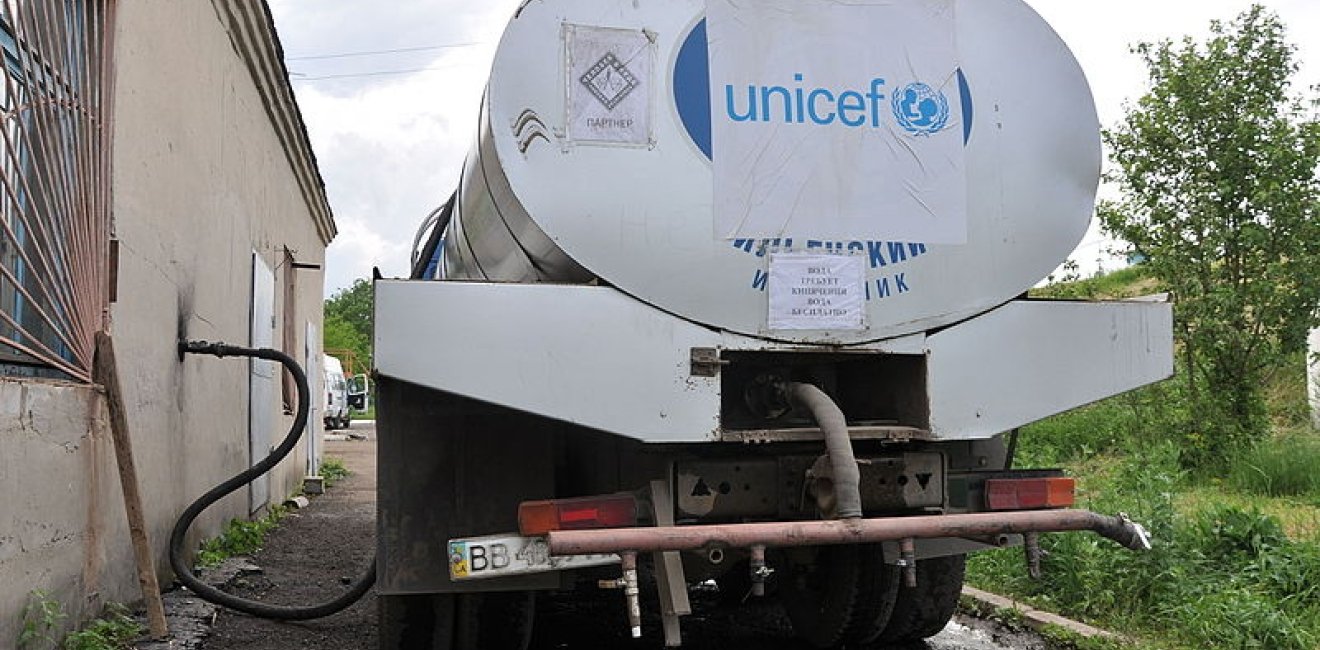
A blog of the Kennan Institute
Ukrainians face a low-intensity war that makes victims without making headlines, though it has killed more than 11,000, has injured more than 24,000 civilians and combatants, and has displaced about 1.6 million people since April 2014. In light of these figures, it is easy to overlook the situation of about 4 million Ukrainians living near the front line who both live in an industrialized region in the heart of Europe and depend on cooperation between the warring sides for their drinking water and central heating. The water distribution network in Luhansk and Donetsk oblasts runs through front-line hotspots and battlefields and sustains damages almost daily. Indeed, one of the long-term consequences of the conflict is attrition of infrastructure. And the collapse of infrastructure not only complicates economic rebuilding, but also engenders further state weakness in a geopolitically fragile region.
Toretsk, a mining town built to service coal mines in the heyday of Soviet industrialization, sits on Kyiv-controlled territory, right at the edge of positions controlled by the separatist forces. But for local residents, the intermittent sound of artillery fire echoing from the front is less of an immediate concern than making sure they have water and enough heating fuel in this continental winter. Throughout December and January, many local residents had no running water and central heating as a result of damage to the water pipeline running to their town from the separatist-controlled, self-declared People's Republic of Donetsk. The Ukrainian local water management company Voda Donbasu monitors the situation at a front-line pumping station, but the risk apparently is considered so great that the instrument panel monitoring water pressure in the system is hung with icons. Thus the local residents depend on improvised coping strategies: they buy drinking water at the local store, hot water is provided by emergency-aid water trucks sent by UNICEF, and many families set up small coal- or wood-heated cast-iron stoves. "Lack of maintenance and shelling" was the clipped assessment of a technician of Voda Donbasu in Toretsk, whom I interviewed a few months ago about risks to infrastructure. So far this winter, technicians have successfully repaired damaged pipes three times. "But how long can we do this for?" they ask. "How do you repair water pipelines that are in woods full of land mines?"
For Voda Donbasu, the outbreak of war meant a staggering overhaul of its operations in terms of management, logistics, and finance. The company’s headquarters are in separatist-controlled Donetsk, while management abides by Ukrainian corporate and tax legislation. To keep communications going—a prerequisite to keeping water flowing between separatist- and government-controlled areas—Voda Donbasu's directors set up a special uplink connecting meeting rooms on both sides for regular management meetings by Skype. A recurrent item on the agenda is revenue. Consumers on the separatist side are billed lower utility fees and in Russian rubles, a currency Voda Donbasu on the government side cannot accept. Entangled in two separate financial systems, the company struggles with cash flow. There is never enough to cover maintenance needs. Also, according to Ukrainian law, accepting revenue from the separatist side can be prosecuted as treason because it represents collaboration with the enemy.
On the separatist side, many Voda Donbasu technicians have not been paid for six months. This is a crucial point because these workers, most of whom have been in their positions for at least a decade, have developed specific skills to maintain the network and have a sense for how it operates. Field observations suggest a strong, locally anchored professional social identity as “people from Donbas," which may partly explain why they are ready to don—without pay—flak jackets and do the plumbing on pipelines during insecure cease-fires. In mid-January, three Voda Donbasu workers were injured by small-arms fire in a shootout as they were clearing snow from the road leading to their facility in Kruta Balka. Part of this adaptation is not specific to Donbas but reflects what anthropologists call "negotiated normality," whereby people develop mechanisms to cope with situations of extreme uncertainty.
There are also structural limits to water distribution in conditions of war. Voda Donbasu lacks funds to cover many of its needs and relies on in-kind humanitarian aid provided by UNICEF, the International Committee of the Red Cross, and the Swiss government, among others, including water treatment chemicals and replacement pipes, and pumps. Whereas in the old days, Voda Donbasu served the local community and interacted with municipal councils, its network has of necessity expanded to the international domain, as interaction with international donors has brought a finer understanding of the humanitarian aid sector.
Ensuring local cease-fires to organize repairs and maintenance on water facilities located in danger zones has also meant expanding operations vertically, through reaching out to governments. Voda Donbasu directors now write letters to the Minsk Contact Group—comprised of representatives from Russia, Ukraine and the OSCE—to request local cease-fires for repairs ("windows of silence"). In the absence of an established procedure to intercede with Kyiv and its enemies, the process remains largely ad hoc, relying on the goodwill of Ukrainian armed forces and the leaders of separatist armed groups, with OSCE intermediation. Between January 2017 and August 2018, the OSCE's mission in Ukraine reportedly facilitated conditions for safe repairs on various infrastructural elements on more than 1,450 occasions. These cease-fires are not a given. They mean hard negotiating and the deployment of complex, heavily manned "mirror patrols," on the ground, as both sides fear that repair work will turn out to be a covert tactic to gain some military advantage. In one case, it took eighteen months to obtain security guarantees from both sides to organize safety conditions to repair leaks on the South Donbas water pipeline, which serves 1.3 million people south to Mariupol. Such delays can result in significant water losses through leakage before the water reaches consumers.
The broader picture of infrastructure collapse shows that the international aid community, local officials, and Voda Donbasu company managers have jointly taken on some of the traditional responsibilities of the state, as the Ukrainian state agencies have failed in the context of war to meet many basic needs of the Donbas population. Indeed, managing transport, communications, and electricity and water networks is closely related to state-building in general. Ukraine’s weakened state capacities in this domain may thus undermine the legitimacy of the state, the consequences of which, in light of eastern Ukraine's geopolitical fragility, shouldn't be underestimated.
Author


Kennan Institute
After more than 50 years as a vital part of the Wilson Center legacy, the Kennan Institute has become an independent think tank. You can find the current website for the Kennan Institute at kennaninstitute.org. Please look for future announcements about partnership activities between the Wilson Center and the Kennan Institute at Wilson Center Press Room. The Wilson Center is proud of its historic connection to the Kennan Institute and looks forward to supporting its activities as an independent center of knowledge. The Kennan Institute is committed to improving American understanding of Russia, Ukraine, Central Asia, the South Caucasus, and the surrounding region through research and exchange. Read more

Explore More in Focus Ukraine
Browse Focus Ukraine
Talking to the Dead to Heal the Living

Ukrainian Issue in Polish Elections


